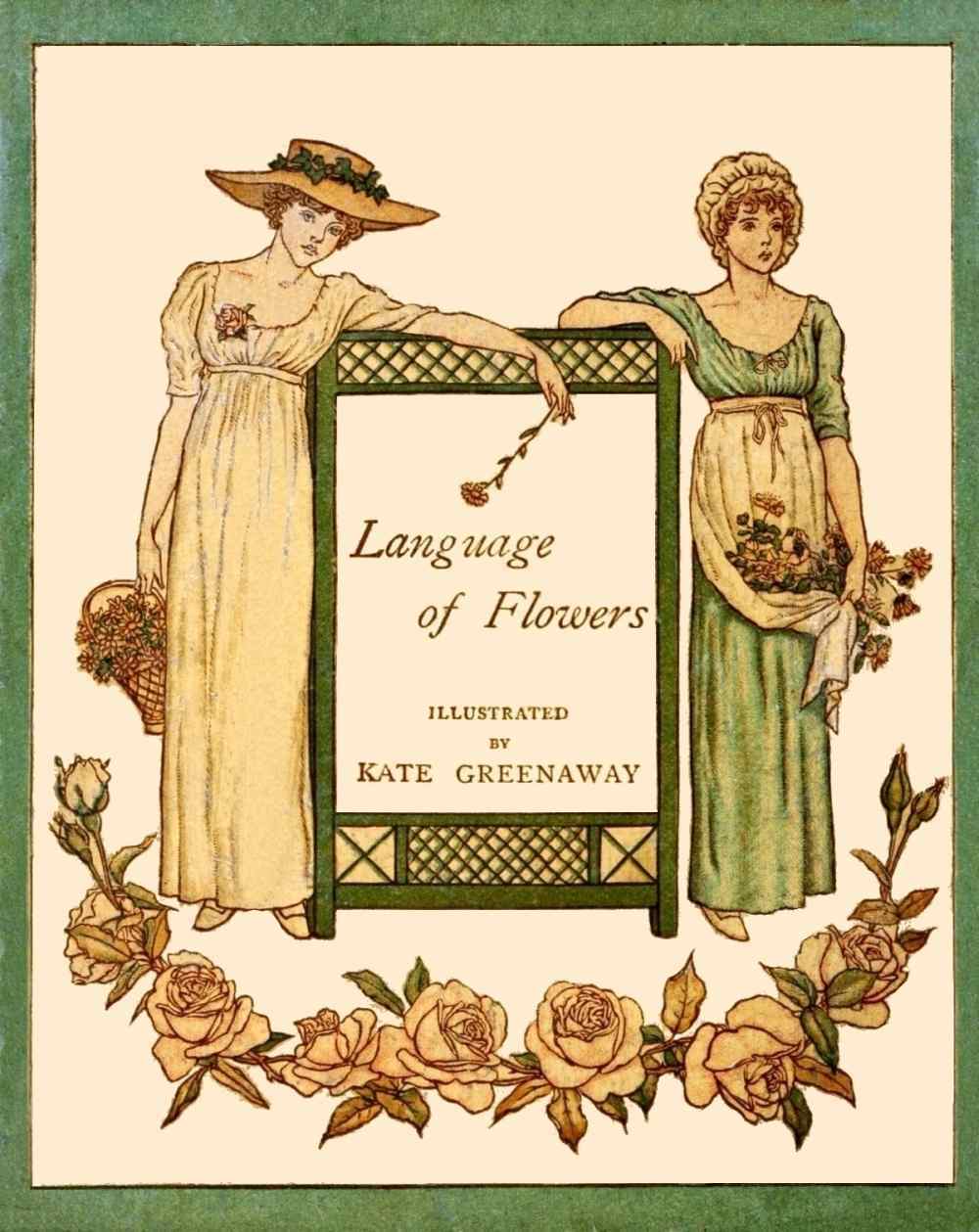
This eBook is for the use of anyone anywhere at no cost and with almost no restrictions whatsoever. You may copy it, give it away or re-use it under the terms of the Project Gutenberg License included with this eBook or online at www.gutenberg.org
Title: Language of Flowers
Author: Kate Greenaway
Release Date: March 10, 2010 [eBook #31591]
Language: English
Character set encoding: ISO-8859-1
***START OF THE PROJECT GUTENBERG EBOOK LANGUAGE OF FLOWERS***
| Note: | Images of the original pages are available through Internet Archive. See http://www.archive.org/details/languageofflower00gree |
| Please click on the images to view them full-sized. |
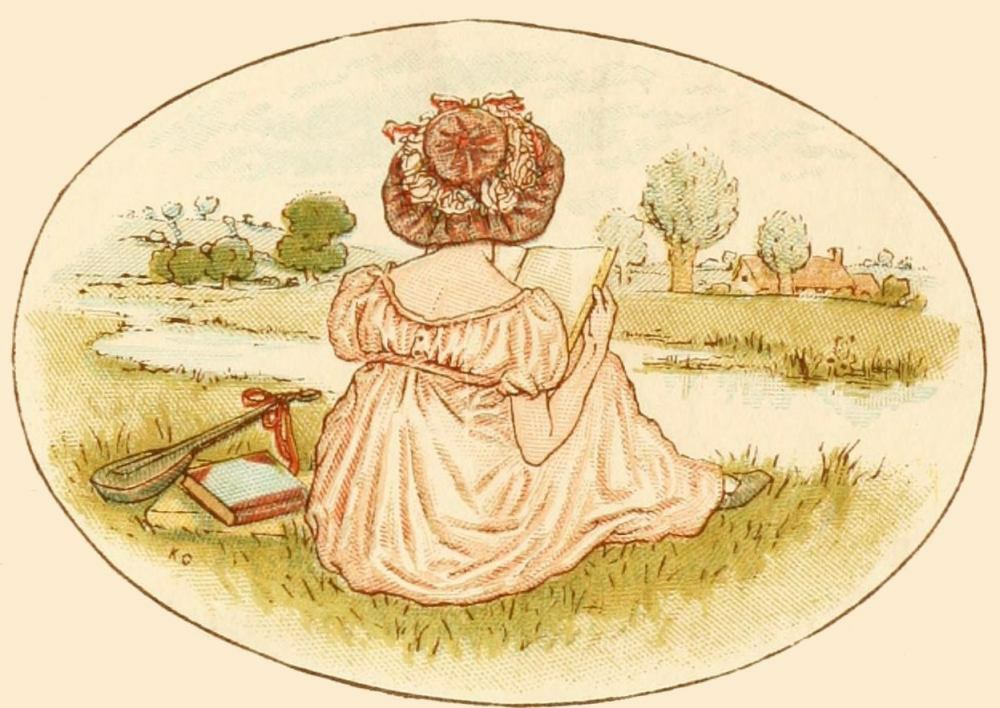
| |
Kennedia | Mental Beauty. |
| King-cups | Desire of Riches. |
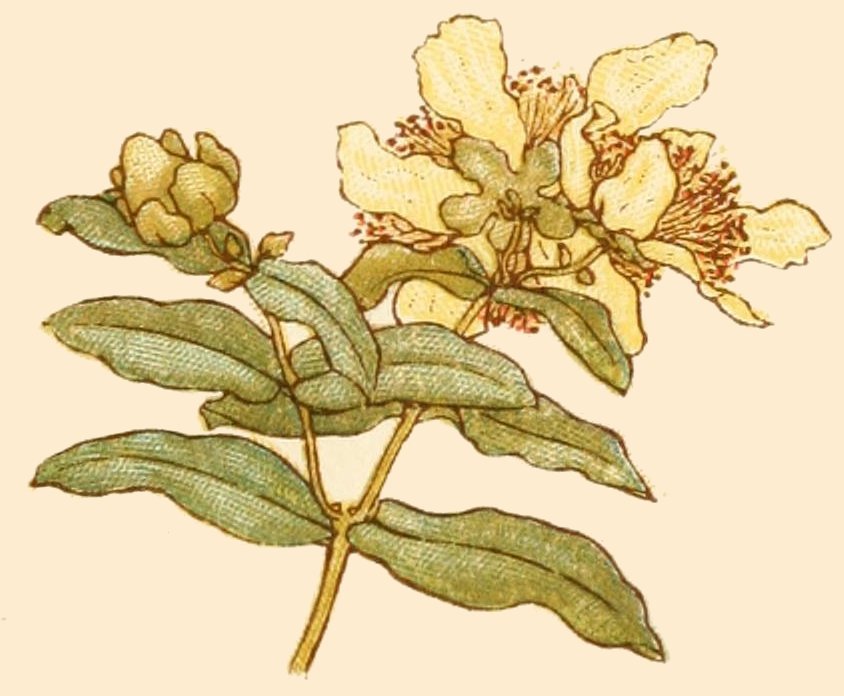 | |
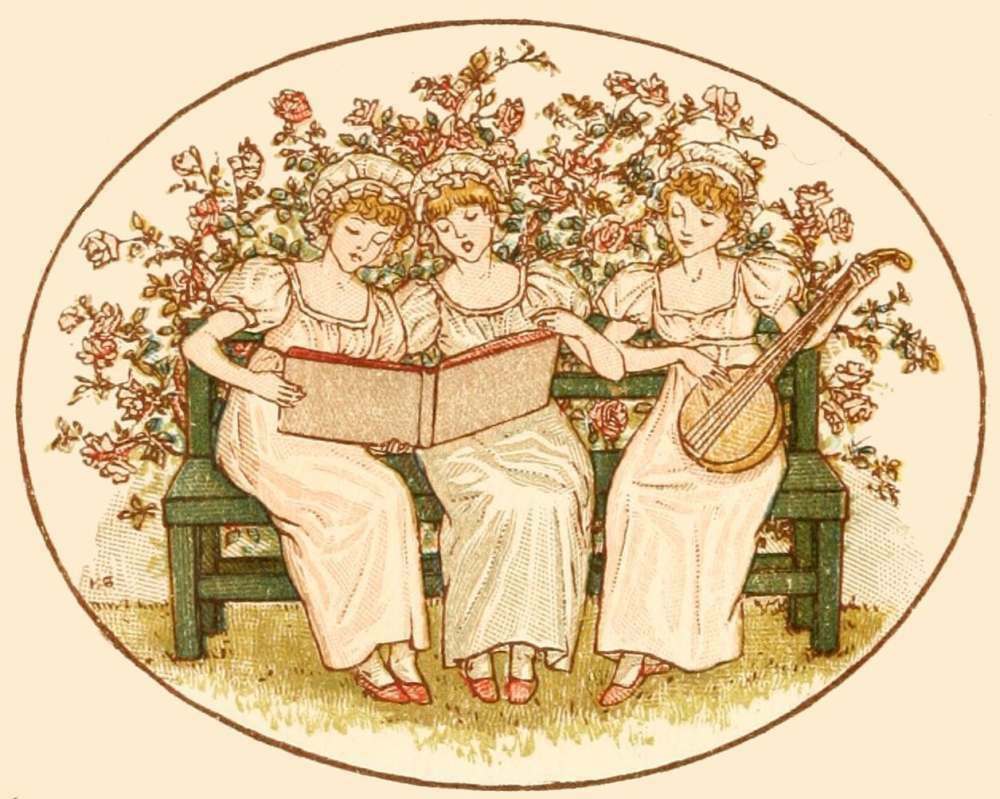 | |||
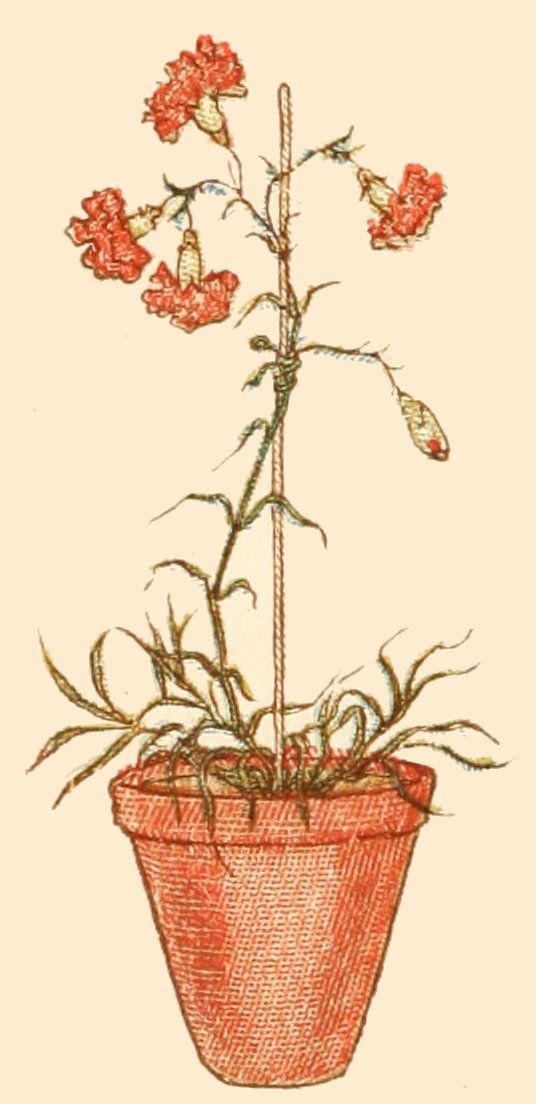 |
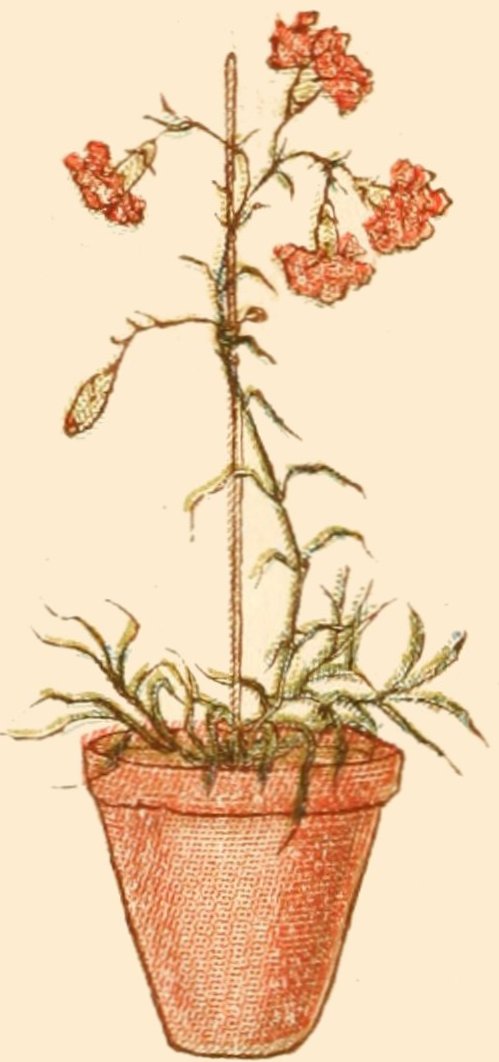 | ||
| Narcissus | Egotism. | ||
| Nasturtium | Patriotism. | ||
| Nettle, Burning | Slander. | ||
| Nettle Tree | Concert. | ||
| Night-blooming Cereus | Transient beauty. | ||
| Night Convolvulus | Night. | ||
| Nightshade | Truth. | ||

|
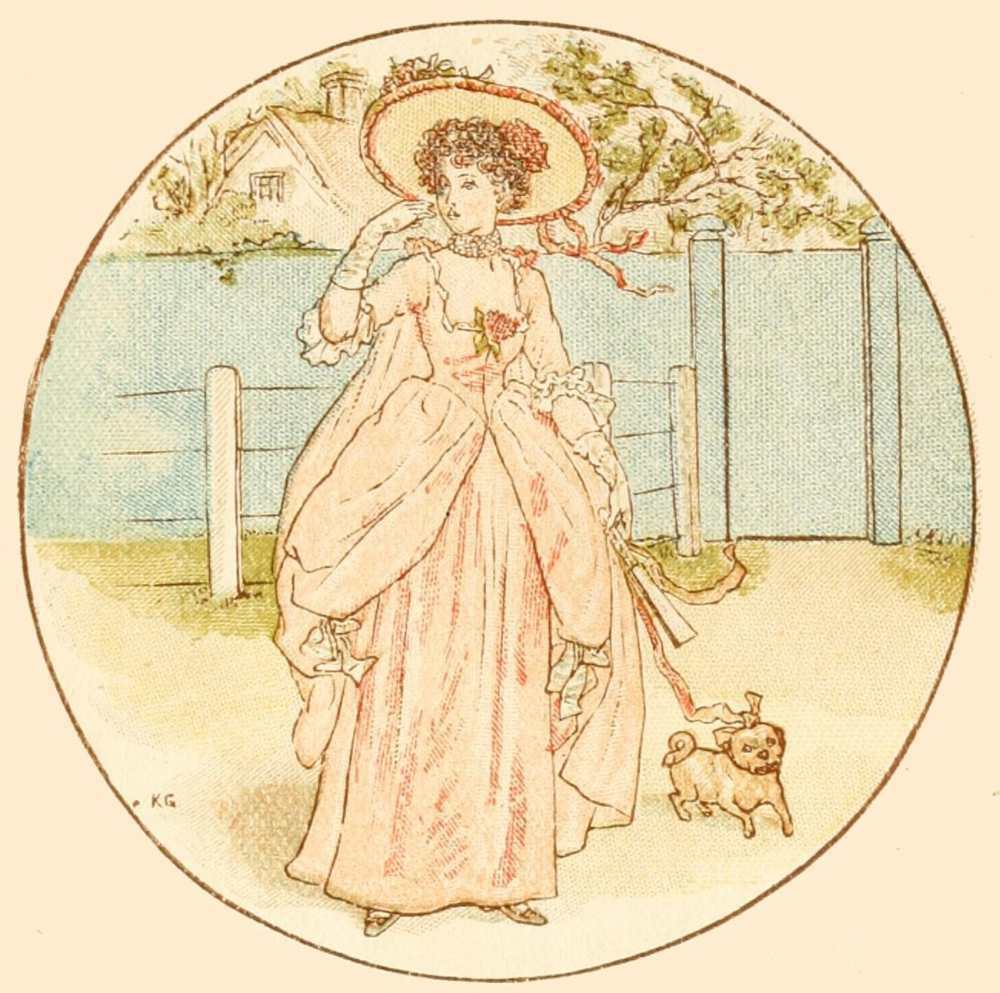 |
 | |
| Quaking-Grass | Agitation. | ||
| Quamoclit | Busybody. | ||
| Queen's Rocket | You are the queen of coquettes. Fashion. | ||
| Quince | Temptation. | ||
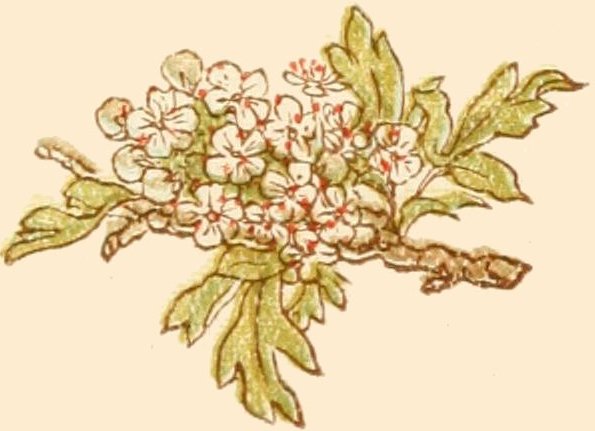 | |||
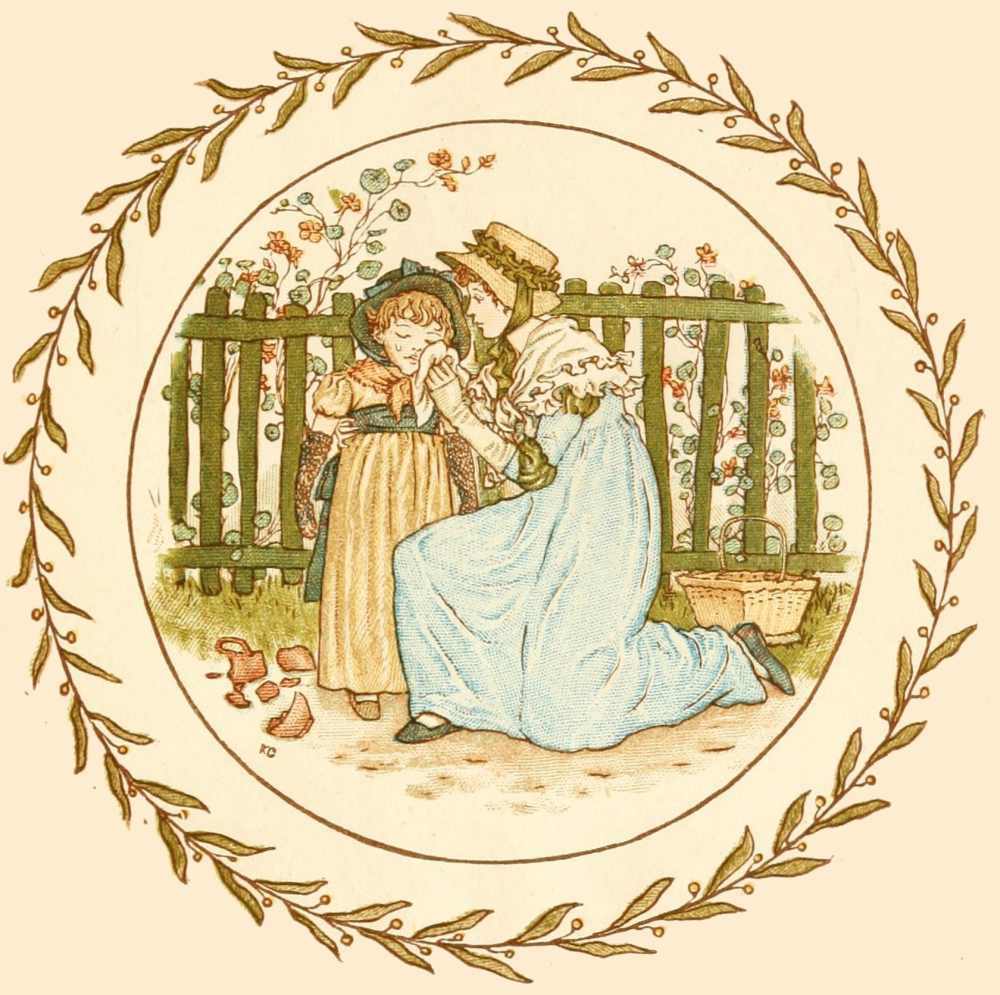 | |
| Xanthium | Rudeness. Pertinacity. |
| Xeranthemum | Cheerfulness under adversity. |
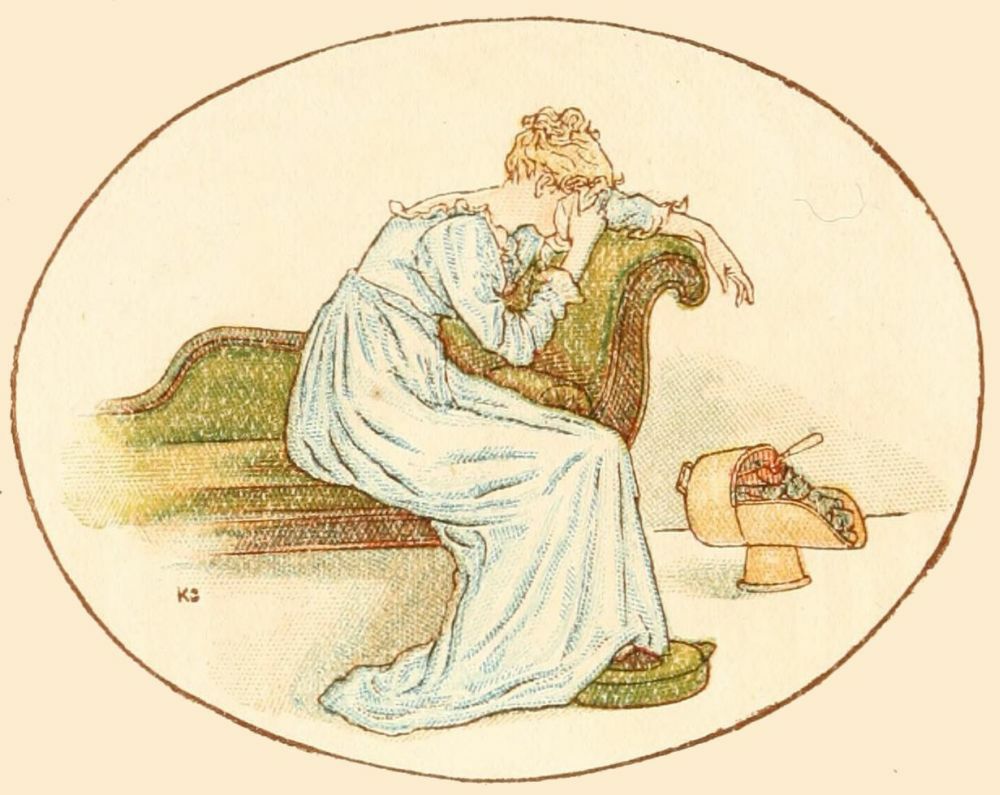 | |
| Yew | Sorrow. |
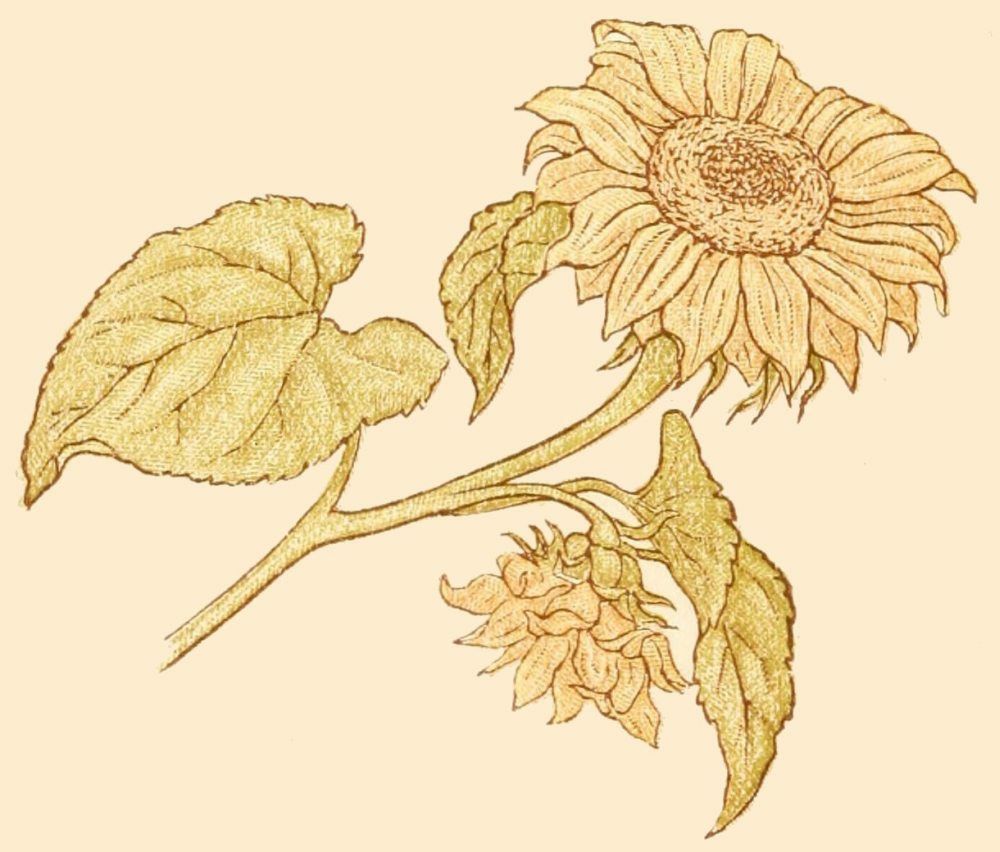 | |
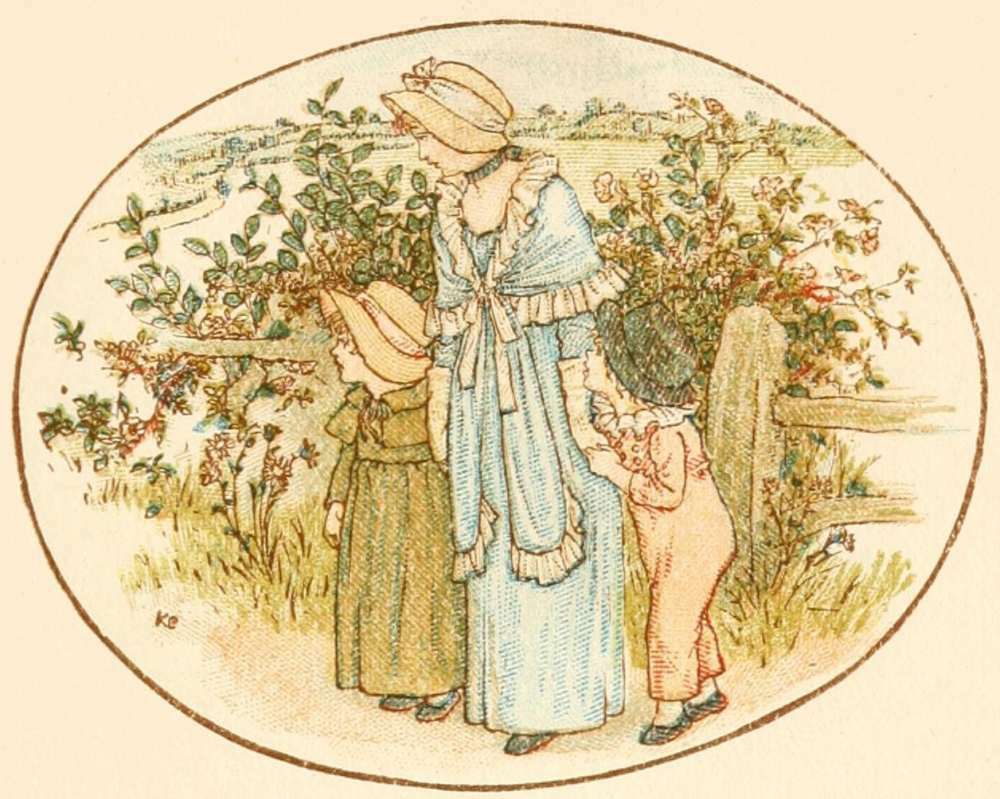 | |
| Zephyr Flower | Expectation. |
| Zinnia | Thoughts of absent friends. |
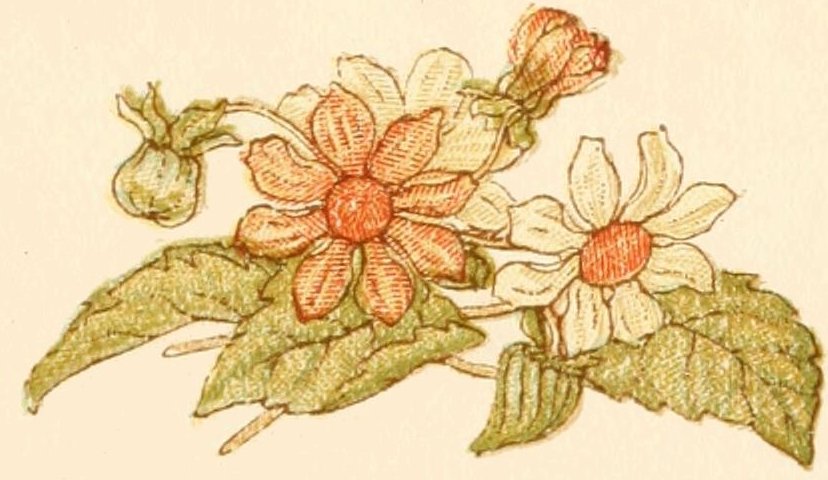 | |
| DAFFODILS. |
|
I wandered lonely as a cloud That floats on high o'er vales and hills, When all at once I saw a crowd, A host of golden Daffodils; Beside the lake, beneath the trees, Fluttering and dancing in the breeze. Continuous as the stars that shine And twinkle in the milky way, They stretched in never-ending line Along the margin of a bay: Ten thousand saw I at a glance, Tossing their heads in sprightly dance. The waves beside them danced; but they Outdid the sparkling waves in glee; A poet could not but be gay, In such a jocund company; I gazed and gazed, but little thought What wealth the show to me had brought! For oft when on my couch I lie, In vacant or in pensive mood, They flash upon that inward eye Which is the bliss of solitude; And then my heart with pleasure fills, And dances with the Daffodils. |
| Wordsworth. |
| THE ROSE. |
|
Go, lovely Rose! Tell her that wastes her time on me, That now she knows, When I resemble her to thee, How sweet and fair she seems to be. Tell her that's young. And shuns to have her graces spied, That hadst thou sprung In deserts where no men abide, Thou must have uncommended died. Small is the worth Of beauty from the light retired; Bid her come forth, Suffer herself to be desired, And not blush so to be admired. Then die, that she The common fate of all things rare May read in thee; How small a part of time they share That are so wondrous sweet and fair, Yet, though thou fade, From thy dead leaves let fragrance rise And teach the maid That goodness Time's rude hand defies; That virtue lives when beauty dies. |
| Waller. |
| THE SENSITIVE PLANT. |
|
A Sensitive Plant in a garden grew, And the young winds fed it with silver dew, And it opened its fan-like leaves to the light, And closed them beneath the kisses of Night. * * * * * * But none ever trembled and panted with bliss In the garden, the field, or the wilderness, Like doe in the noontide with love's sweet want, As the companionless Sensitive Plant. The snowdrop, and then the violet, Arose from the ground with warm rain wet, And their breath was mixed with fresh odour, sent, From the turf, like the voice and the instrument. Then the pied wind-flowers and the tulip tall, And narcissi, the fairest among them all, Who gaze on their eyes in the stream's recess, Till they die of their own dear loveliness. And the naiad-like lily of the vale. Whom youth makes so fair and passion so pale, That the light of its tremulous bells is seen Through their pavilions of tender green; And the hyacinth purple, and white, and blue, Which flung from its bells a sweet peal anew Of music so delicate, soft and intense, It was felt like an odour within the sense! And the rose like a nymph to the bath addrest, Which unveiled the depth of her glowing breast, Till, fold after fold, to the fainting air The soul of her beauty and love lay bare; And the wand-like lily, which lifted up, As a Mænad, its moonlight-coloured cup, Till the fiery star, which is its eye, Gazed through the clear dew on the tender sky; And the jessamine faint, and the sweet tuberose, The sweetest flower for scent that blows; And all rare blossoms from every clime Grew in that garden in perfect prime. The Sensitive Plant, which could give small fruit Of the love which it felt from the leaf to the root, Received more than all [flowers], it loved more than ever, Where none wanted but it, could belong to the giver— For the Sensitive Plant has no bright flower; Radiance and odour are not its dower; It loves, even like Love its deep heart is full, It desires what it has not, the beautiful! * * * * * * Each and all like ministering angels were For the Sensitive Plant sweet joy to bear. Whilst the lagging hours of the day went by Like windless clouds o'er a tender sky. And when evening descended from heaven above, And the earth was all rest, and the air was all love, And delight, though less bright, was far more deep, And the day's veil fell from the world of sleep, * * * * * * The Sensitive Plant was the earliest Up-gathered into the bosom of rest; A sweet child weary of its delight, The feeblest, and yet the favourite, Cradled within the embrace of night. |
| Shelley. |
| O LUVE WILL VENTURE IN, &c. |
| Tune—"The Posie." |
|
O luve will venture in, where it daur na weel be seen, O luve will venture in, where wisdom ance has been; But I will down yon river rove, amang the wood sae green, And a' to pu' a posie to my ain dear May. The primrose I will pu', the firstling o' the year, And I will pu' the pink, the emblem o' my dear, For she's the pink o' womankind, and blooms without a peer; And a' to be a posie to my ain dear May. I'll pu' the budding rose, when Phœbus peeps in view, For it's like a baumy kiss o' her sweet bonnie mou; The hyacinth's for constancy w' its unchanging blue, And a' to be a posie to my ain dear May. The lily it is pure, and the lily it is fair. And in her lovely bosom I'll place the lily there; The daisy's for simplicity and unaffected air, And a' to be a posie to my ain dear May. The hawthorn I will pu', wi' its locks o' siller grey, Where, like an aged man, it stands at break o' day, But the songster's nest within the bush I winna tak away; And a' to be a posie to my ain dear May. The woodbine I will pu' when the e'ening star is near, And the diamond-drops o' dew shall be her e'en sae clear: The violet's for modesty which weel she fa's to wear, And a' to be a posie to my ain dear May. I'll tie the posie round w' the silken band o' luve, And I'll place it in her breast, and I'll swear by a' above, That to my latest draught o' life the band shall ne'er remuve. And this will be a posie to my ain dear May. |
| Burns. |
| MY NANNIE'S AWA. |
| Tune—"There'll never be peace" &c. |
|
Now in her green mantle blithe Nature arrays. And listens the lambkins that bleat o'er the braes, While birds warble welcome in ilka green shaw; But to me it's delightless—my Nannie's awa. The snaw-drap and primrose our woodlands adorn, And violets bathe in the weet o' the morn; They pain my sad bosom, sae sweetly they blaw, They mind me o' Nannie—and Nannie's awa. Thou lav'rock that springs frae the dews of the lawn, The shepherd to warn o' the grey-breaking dawn, And thou mellow mavis that hails the night-fa', Give over for pity—my Nannie 's awa. Come, autumn, sae pensive, in yellow and grey, And sooth me wi' tidings o' Nature's decay; The dark, dreary winter, and wild-driving snaw, Alane can delight me—now Nannie's awa, |
| Burns. |
| THEIR GROVES, &c. |
| Tune—"Humours of Glen." |
|
Their groves o' sweet myrtle let foreign lands reckon, Where bright-beaming summers exalt the perfume; Far dearer to me yon lone glen o' green breckan, Wi' the burn stealing under the lang yellow broom. Far dearer to me are yon humble broom bowers, Where the blue-bell and gowan lurk lowly unseen; For there, lightly tripping amang the wild flowers, A listening the linnet, aft wanders my Jean. |
| Burns. |
| TO A MOUNTAIN DAISY, |
| On turning one down with a plough, in April 1786. |
Wee, modest, crimson-tipped flow'r, Thou's met me in an evil hour; For I maun crush amang-the stoure Thy slender stem; To spare ihee now is past my po'w'r, Thou bonnie gem. Alas! it's no thy neebor sweet, The bonnie Lark, companion meet! Bending thee 'mang the dewy weet! Wi' spreckled breast, When upward-springing, blythe, to greet The purpling east. Could blew the bitter-biting north Upon thy early, humble birth; Yet cheerfully thou glinted forth Amid the storm, Scarce rear'd above the parent earth Thy tender form. The flaunting flow'rs our gardens yield. High shell'ring woods and wa's maun shield, But thou beneath the random bield O' clod or stane, Adorns the histie stibbte-Jleld, Unseen, alane. There, in thy scanty mantle clad, Thy snawy bosom sun-ward spread, Thou lifts thy unassuming head In humble guise; But now the share uptears thy bed, And low thou lies! Such is the fate of artless Maid, Sweety flow'ret of the rural shade! By love's simplicity betray'd. And guileless trust, Till she, like thee, all soil'd, is laid Low i' the dust. Such is the fate of simple Bard, On life's rough ocean luckless starr'd! Unskilful he to note the card Of prudent lore, Till billows rage, and gales blow hard. And whelm him o'er! Such fate to suffering worth is giv'n, Who long with wants and woes has striv'n, By human pride or cunning driv'n, To mis'ry's brink. Till wrench'd of ev'ry stay but Heav'n, He, ruin'd, sink! Ev'n thou who mourn'st the Daisy's fate, That fate is thine—no distant date; Stern Ruin's plough-share drives, elate. Full on thy bloom, Till crush'd beneath the furrow's weight, Shall be thy doom! |
| Burns. |
| LAMENT OF MARY, QUEEN OF SCOTS. |
| On the Approach of Spring. |
|
Now Nature hangs her mantle green On every blooming tree, And spreads her sheets c' daisies white Out o'er the grassy lea; Now Phœbus cheers the crystal streams, And glads the azure skies; But nought can glad the weary wight That fast in durance lies. Now lav'rocks wake the merry morn, Aloft on dewy wing; The merle, in his noontide bow'r, Makes woodland echoes ring; The mavis mild wi' many a note, Sings drowsy day to rest: In love and freedom they rejoice, Wi' care nor thrall opprest. Now blooms the lily by the bank, The primrose down the brae; The hawthorn's budding in the glen, And milk-white is the slae; The meanest hind in fair Scotland May rove their sweets amang; But I, the Queen of a' Scotland, Maun lie in prison strang. I was the Queen o' bonnie France, Where happy I hae been; Fu' lightly rase I in the morn, As blythe lay down at e'en; And I'm the sov'reign of Scotland, And mony a traitor there; Yet here I lie in foreign Lands, And never ending care. But as for thee, thou false woman, My sister and my fae, Grim vengeance, yet, shall whet a sword That thro thy soul shall gae: The weeping blood in woman's breast Was never known to thee; Nor th' balm that draps on wounds of woe Frae woman's pitying e'e. My son! my son! may kinder stars Upon thy fortune shine; And may those pleasures gild thy reign. That ne'er wad blink on mine! God keep thee frae thy mother's faes, Or turn their hearts to thee: And where thou meet'st thy mother's friend, Remember him for me! Oh! soon, to me, may summer-suns Nae mair light up the morn! Nae mair, to me, the autumn winds Wave o'er the yellow corn! And in the narrow house o' death Let winter round me rave; And the next flow'rs that deck the spring, Bloom on my peaceful grave! |
| Burns. |
| RED AND WHITE ROSES. |
|
Read in these Roses the sad story Of my hard fate, and your own glory; In the white you may discover The paleness of a fainting lover; In the red the flames still feeding On my heart with fresh wounds bleeding. The white will tell you how I languish, And the red express my anguish. The white my innocence displaying, The red my martyrdom betraying; The frowns that on your brow resided, Have those roses thus divided. Oh! let your smiles but clear the weather, And then they both shall grow together. |
| Cakew. |
| SONNET. |
|
Sweet is the rose, but growes upon a brere; Sweet is the Juniper, but sharpe his bough; Sweet is the Eglantine, but pricketh nere; Sweet is the Firbloom, but his branches rough; Sweet is the Cypress, but his rind is tough, Sweet is the Nut, but bitter is his pill; Sweet is the Broome-flowere, but yet sowre enough; And sweet is Moly, but his roote is ill. So every sweet with sowre is tempred still, That maketh it be coveted the more: For easie things that may be got at will, Most sorts of men doe set but little store. Why then should I account of little pain, That endless pleasure shall unto me gaine? |
| Spenser |
| TO PRIMROSES |
| FILLED WITH MORNING DEW. |
|
Why do ye weep, sweet babes? Can tears Speak grief in you, Who were but born Just as the modest morn Teemed her refreshing dew? Alas! ye have not known that shower That mars a flower; Nor felt the unkind Breath of a blasting wind; Nor are ye worn with years; Or warped as we, Who think it strange to see Such pretty flowers, like to orphans young. Speaking by tears before ye have a tongue. Speak, whimpering younglings, and make known The reason why Ye droop and weep, Is it for want of sleep, Or childish lullaby Or that ye have not seen as yet The violet Or brought a kiss From that sweetheart to this? No, no; this sorrow shown By your tears shed, Would have this lecture read: That things of greatest, so of meanest worth. Conceived with grief are, and with tears brought forth. |
| Herrick. |
| A RED, RED ROSE. |
| Tune—"Wishaw's favourite." |
|
O, my luve's like a red, red rose, That's newly sprung in June: O, my luve's like the melodie That's sweetly play'd in tune. As fair art thou, my bonnie lass. So deep in hive am I; And I will luve thee still, my dear, Till a' the seas gang dry. Till a' the seas gang dry, my dear, And the rocks melt w' the sun; I will luve thee still, my dear, While the sands o' life shall run. And fare thee weel, my only luve! And fare thee weel a while; And I will come again, my luve, Tho' it were ten thousand mile. |
| Burns. |
|
Virgins promised when I died, That they would each primrose-tide Duly, morn and evening, come, And with flowers dress my tomb. —Having promised, pay your debts, Maids, and here strew violets. |
| Robert Herrick. |
|
Music, when soft voices die, Vibrates in the memory; Odours when sweet violets sicken, Love within the sense they quicken. Rose leaves, when the rose is dead, Are heaped for the beloved's bed; And so thy thoughts when thou art gone. Love itself shall slumber on. |
| Shelley. |
|
Radiant sister of the day Awake! arise! and come away! To the wild woods and the plains, To the pools where winter rains Image all their roof of leaves, Where the pine its garland weaves Of sapless green, and ivy dun, Round stems that never kiss the sun. Where the lawns and pastures be And the sandhills of the sea, Where the melting hoar-frost wets The daisy star that never sets, And wind-flowers and violets Which yet join not scent to hue Crown the pale year weak and new: When the night is left behind In the deep east, dim and blind, And the blue moon is over us, And the multitudinous Billows murmur at our feet, Where the earth and ocean meet And all things seem only one In the universal sun. |
| P. B. Shelley. |
| TO DAFFODILS. |
|
Fair Daffodils, we weep to see You haste away so soon; As yet, the early-rising sun Has not attained its noon. Stay, stay, Until the hastening day Has run But to the even song; And having prayed together, we Will go with you along. We have short time to stay as you, We have as short a spring; As quick a growth to meet decay, As you or any thing. We die, As your hours do, and dry Away, Like to the summer's rain, Or as the pearls of morning's dew, Ne'er to be found again. |
| Robert Herrick. |
| CONSTANCY. |
|
Lay a garland on my hearse Of the dismal yew; Maidens willow branches bear; Say, I died true. My love was false, but I was firm From my hour of birth. Upon my buried body lie Lightly, gentle earth! |
| Samuel Fletcher. |
|
Mourn, ilka grove the cushat kens! Ye haz'lly shaws and briery dens! Ye burnies, wimplin down your glens, Wi' toddlin din, Or foaming strang, wi' hasty stens, Frae lin to lin. Mourn little harebells o'er the lee; Ye stately foxgloves fair to see; Ye woodbines hanging bonnilie, In scented bow'rs; Ye roses on your thorny tree. The first o' flow'rs. At dawn, when ev'ry grassy blade Droops with a diamond at his head, At ev'n, when beans their fragrance shed, I' th' rustling gale, Ye maukins whiddin thro' the glade, Come join my wail. Mourn, spring, thou darling of the year; Ilk cowslip cup shall kep a tear: Thou, simmer, while each corny spear Shoots up its head, Thy gay, green, flow'ry tresses shear, For him that's dead! Thou, autumn, wi' thy yellow hair, In grief thy sallow mantle tear! Thou, winter, hurling thro' the air The roaring blast, Wide o'er the naked world declare The worth we've lost! |
| Burns. |
| TO THE SMALL CELANDINE. |
|
Ppansies, Lilies, King-cups, Daisies, Let them live upon their praises; Long as there's a sun that sets, Primroses will have their glory; Long as there are Violets, They will have a place in story; There's a flower that shall be mine, 'Tis the little Celandine. Ere a leaf is on the bush, In the time before the thrush Has a thought about her nest, Thou wilt come with half a call, Spreading out thy glossy breast Like a careless prodigal; Telling tales about the sun, When we've little warmth, or none. Comfort have thou of thy merit, Kindly unassuming spirit! Careless of thy neighbourhood, Thou dost show thy pleasant face On the moor, and in the wood, In the lane—there's not a place, Howsoever mean it be, But 'tis good enough for thee. Ill befall the yellow flowers, Children of the flaring hours! Buttercups that will be seen, Whether we will see or no; Others, too, of lofty mien, They have done as worldlings do, Taken praise that should be thine, Little, humble Celandine! Prophet of delight and mirth, Ill requited upon earth; Herald of a mighty band, Of a joyous train ensuing, Serving at my heart's command, Tasks that are no tasks renewing; I will sing, as doth behove, Hymns in praise of what I love! |
| Wordsworth. |
| TO BLOSSOMS. |
|
Ffair pledges of a fruitful tree, Why do ye fall so fast? Your date is not so past, But you may stay yet here awhile To blush and gently smile. And go at last. What, were you born to be, An hour or half's delight, And so to bid good-night? 'Twas pity Nature brought ye forth, Merely to show your worth And lose you quite. But you are lovely leaves, where we May read, how soon things have Their end, though ne'er so brave: And after they have shown their pride, Like you, awhile, they glide Into the grave. |
| Herrick. |
| THE LILY AND THE ROSE. |
|
The nymph must lose her female friend, If more admired than she— But where will fierce contention end, If flowers can disagree. Within the garden's peaceful scene Appear'd two lovely foes, Aspiring to the rank of queen, The Lily and the Rose. The Rose soon redden'd into rage, And, swelling with disdain, Appeal'd to many a poet's page To prove her right to reign. The Lily's height bespoke command, A fair imperial flower; She seem'd designed for Flora's hand, The sceptre of her power. This civil bick'ring and debate The goddess chanced to hear, And flew to save, ere yet too late, The pride of the parterre. Yours is, she said, the nobler hue, And yours the statelier mien; And, till a third surpasses you, Let each be deemed a queen. Thus, soothed and reconciled, each seeks The fairest British fair: The seat of empire is her cheeks, They reign united there. |
| Cowper. |
| THE WALL-FLOWER. |
|
Why this flower is now called so, List, sweet maids, and you shall know. Understand this firstling was Once a brisk and bonny lass, Kept as close as Danae was, Who a sprightly springald loved; And to have it fully proved, Up she got upon a wall, 'Tempting down to slide withal; But the silken twist untied, So she fell, and, bruised, she died. Jove, in pity of the deed, And her loving, luckless speed, Turn'd her to this plant we call Now "the flower of the wall." |
| Herrick. |
| THE PRIMROSE. |
|
Ask me why I send you here, This firstling of the infant year; Ask me why I send to you This Primrose all bepearled with dew; I straight will whisper in your ears, The sweets of love are washed with tears. Ask me why this flower doth show So yellow, green, and sickly too; Ask me why the stalk is weak And bending, yet it doth not break; I must tell you, these discover What doubts and fears are in a lover. |
| Carew. |
| ADONIS SLEEPING, |
|
In midst of all, there lay a sleeping youth Of fondest beauty. Sideway his face reposed On one white arm, and tenderly unclosed, By tenderest pressure, a faint damask mouth To slumbery pout; just as the morning south Disparts a dew-lipp'd rose. Above his head, Four lily stalks did their white honours wed To make a coronal; and round him grew All tendrils green, of every bloom and hue, Together intertwined and trammel'd fresh: The vine of glossy sprout; the ivy mesh, Shading its Ethiop berries; and woodbine, Of velvet leaves, and bugle blooms divine. Hard by, Stood serene Cupids watching silently. One, kneeling to a lyre, touch'd the strings, Muffling to death the pathos with his wings; And, ever and anon, uprose to look At the youth's slumber; while another took A willow bough, distilling odorous dew, And shook it on his hair; another flew In through the woven roof, and fluttering-wise, Rain'd violets upon his sleeping eyes. |
| Keats. |
|
Modonna, wherefore hast thou sent to me Sweet Basil and Mignonette, Embleming love and health, which never yet In the same wreath might be. Alas, and they are wet! Is it with thy kisses or thy tears? For never rain or dew Such fragrance drew From plant or flower; the very doubt endears My sadness ever new, The sighs I breathe, the tears I shed, for thee. |
| P. B. Shelley. |
|
There grew pied Wind-flowers and Violets, Daisies, those pearl'd Arcturi of the earth, The constellated flowers that never set; Faint Oxlips; tender Blue-bells, at whose birth The sod scarce heaved; and that tall flower that wets Its mother's face with Heaven-collected tears, When the low wind, its playmate's voice, it hears. And in the warm hedge grew lush Eglantine, Green Cow-bind and the moonlight-colour'd May And cherry blossoms, and white cups, whose wine Was the bright dew yet drained not by the day; And Wild Roses, and Ivy serpentine With its dark buds and leaves, wandering astray, And flowers azure, black, and streaked with gold, Fairer than any wakened eyes behold. And nearer to the river's trembling edge There grew broad flag-flowers, purple prankt with white, And starry river buds among the sedge. And floating Water-lilies, broad and bright, Which lit the oak that overhung the hedge With moonlight beams of their own watery light; And bulrushes, and reeds of such deep green As soothed the dazzled eye with sober sheen. |
| P. B. Shelley. |
|
Fade, Flow'rs! fade, Nature will have it so; 'Tis but what we must in our autumn do! And as your leaves lie quiet on the ground, The loss alone by those that lov'd them found; So in the grave shall we as quiet lie, Miss'd by some few that lov'd our company; But some so like to thorns and nettles live, That none for them can, when they perish, grieve. |
| Waller. |
| ARRANGEMENT OF A BOUQUET. |
|
Here damask Roses, white and red, Out of my lap first take I, Which still shall run along the thread, My chiefest flower this make I. Amongst these Roses in a row, Next place I Pinks in plenty, These double Pansies then for show; And will not this be dainty The pretty Pansy then I'll tie, Like stones some chain inchasing; And next to them, their near ally, The purple Violet placing. The curious choice clove July flower, Whose kind hight the Carnation, For sweetnest of most sovereign power, Shall help my wreath to fashion; Whose sundry colours of one kind, First from one root derived, Them in their several suits I'll bind: My garland so contrived. A course of Cowslips then I'll stick, And here and there (though sparely) The pleasant Primrose down I'll prick. Like pearls that will show rarely; Then with these Marigolds I'll make My garland somewhat swelling, These Honeysuckles then I'll take, Whose sweets shall help their smelling. The Lily and the Fleur-de-lis. For colour much contending; For that I them do only prize, They are but poor in scenting. The Daffodil most dainty is, To match with these in meetness; The Columbine compared to this, All much alike for sweetness. These in their natures only are Fit to emboss the border. Therefore I'll take especial care To place them in their order: Sweet-williams, Campions, Sops-in-wine, One by another neatly; Thus have I made this wreath of mine, And finished it featly. |
| Nicholas Drayton. |
| THE CHERRY. |
|
There is a garden in her face, Where roses and white lilies grow; A heavenly paradise is that place. Wherein all pleasant fruits do grow; There cherries grow that none may buy Till cherry ripe themselves do cry. Those cherries fairly do enclose Of orient pearl a double row, Which, when her lovely laughter shows, They look like rosebuds fill'd with snow; Yet them no peer nor prince may buy Till cherry ripe themselves do cry. Her eyes like angels watch them still, Her brows like bended bows do stand, Threatening with piercing frowns to kill All that approach with eye or hand These sacred cherries to come nigh. Till cherry ripe themselves do cry. |
| Richard Allison |
| THE GARLAND. |
|
The pride of every grove I chose, The violet sweet and lily fair, The dappled pink and blushing rose, To deck my charming Cloe's hair. At morn the nymph vouchaf'd to place Upon her brow the various wreath; The flowers less blooming than her face, The scent less fragrant than her breath. The flowers she wore along the day; And every nymph and shepherd said, That in her hair they look'd more gay Than glowing in their native bed. Undrest, at ev'ning, when she found Their odours lost, their colours past; She chang'd her look, and on the ground Her garland and her eye she cast. That eye dropt sense distinct and clear, As any muse's tongue could speak, When from its lid a pearly tear Ran trickling down her beauteous cheek. Dissembling what I knew too well; My love! my life! said I, explain This change of humour; pray thee tell: That falling tear.—What does it mean She sigh'd, she smil'd; and to the flowers Pointing, the lovely moralist said: See! friend, in some few fleeting hours, See yonder, what a change is made! Ah me! the blooming pride of May, And that of beauty are but one: At morn both flourish bright and gay, Both fade at ev'ning, pale, and gone! At dawn poor Stella danc'd and sung; The am'rous youth around her bow'd: At night her fatal knell was rung! I saw and kiss'd her in her shroud; Such as she is, who dy'd to-day, Such I, alas! may be to-morrow: Go, Damon, bid thy muse display The justice of thy Cloe's sorrow. |
| Prior. |
| TO THE VIRGINS, TO MAKE, |
| MUCH OF TIME, |
|
Gather ye rose-buds while ye may: Old Time is still a-flying; And this same flower that smiles to-day, To-morrow will be dying. The glorious lamp of heaven, the sun, The higher he's a-getting, The sooner will his race be run, And nearer he's to setting. That age is best, which is the first, When youth and blood are warmer; But being spent, the worse and worst Times will succeed the former. —Then be not coy, but use your time, And while ye may, go marry; For having lost but once your prime, You may for ever tarry. |
| Robert Herrick. |
| SONG OF MAY MORNING. |
|
Now the bright morning-star, day's harbinger, Comes dancing from the east, and leads with her The flowery May, who from her green lap throws The yellow cowslip, and the pale primrose. Hail, bounteous May, that dost inspire Mirth, and youth, and warm desire; Woods and groves are of thy dressing, Hill and dale doth boast thy blessing. Thus we salute thee with our early song, And welcome thee, and wish thee long. |
| Milton. |
|
Among the myrtles as I walk'd, Love and my Sight thus intertalk'd: Tell me, said I, in deep distress, Where I may find my Shepherdess? —Thou Fool, said Love, know'st thou not this? In everything that's sweet she is. In yon'd Carnation go and seek, There thou shalt find her lips and cheek; In that enamell'd Pansy by, There thou shalt have her curious eye; In bloom of Peach and Rose's bud There waves the streamer of her blood. —'Tis true, said I; and thereupon I went to pluck them one by one, To make of parts an unión; But on a sudden all were gone. At which I stopp'd; said Love, these be The true resemblance of Thee; For as these Flowers, thy joys must die; And in the turning of an eye; And all thy hopes of her must wither, Like those short sweets here knit together. |
| Robert Herrick. |
| FRAGMENT, IN WITHERSPOON'S |
| COLLECTION OF SCOTCH SONGS. |
| Tune—"Hughie Graham" |
|
"O gin my love were yon red rose, "That grows upon the castle wa'; "And I mysel' a drap o' dew, "Into her bonnie breast to fa'! "Oh, there beyond expression blest, "I'd feast on beauty a' the night; "Seal'd on her silk-waft faulds to rest, "Till fley'd awa by Phœbus' light." O were my love yon lilac fair, Wi' purple blossoms to the spring; And I, a bird to shelter there, When wearied on my little wing; How I wad mourn, when it was torn By autumn wild, and winter rude! But I wad sing on wanton wing, When youthfu' May its bloom renew'd.[*] |
| [*] These stanzas were added by Burns. |
| THE DAISY. |
|
Of all the floures in the mede Than love I most these floures white and rede Soch that men callen Daisies in our town, To hem I have so great affection, As I sayd erst, when comen is the Maie. That in my bedde there daweth me no daie, That I n'am up and walking in the mede To see this floure ayenst the Sunne sprede; Whan it up riseth early by the morrow, That blissful sight softeneth all my sorrow. |
| Chaucer. |
| Page | |||
| A | Acacia | Friendship. | 7 |
| B | Bladder Nut Tree | Frivolity. Amusement. | 9 |
| C | Cowslip, American | Divine beauty. You are my divinity. | 11 |
| D | Dead Leaves | Sadness. | 15 |
| E | Enchanter's Nightshade | Witchcraft. Sorcery. | 16 |
| F | Fig Marigold | Idleness. | 17 |
| G | Grape, Wild | Charity. | 19 |
| H | Hyacinth | Sport. Game. Play. | 21 |
| I | Indian Jasmine (Ipomœa) | Attachment. | 23 |
| J | Jacob's Ladder | Come down. | 24 |
| K | Kennedia | Mental beauty. | 25 |
| L | Larkspur, Purple | Naughtiness. | 26 |
| M | Moss | Maternal love. | 28 |
| N | Nettle Tree | Concert. | 30 |
| O | Osmunda | Dreams. | 31 |
| P | Periwinkle, Blue | Early friendship. | 32 |
| Q | Queen's Rocket | You are the Queen of Coquettes. Fashion. | 35 |
| R | Rose | Love. | 36 |
| S | Southernwood | Jest. Bantering. | 38 |
| T | Thrift | Sympathy. | 40 |
| V | Veronica | Fidelity. | 42 |
| W | Wood Sorrel | Joy. Maternal tenderness. | 43 |
| X | Xeranthemum | Cheerfulness under adversity. | 45 |
| Y | Yew | Sorrow. | 46 |
| Z | Zephyr Flower | Expectation. | 47 |
***END OF THE PROJECT GUTENBERG EBOOK LANGUAGE OF FLOWERS***
******* This file should be named 31591-h.txt or 31591-h.zip *******
This and all associated files of various formats will be found in:
http://www.gutenberg.org/3/1/5/9/31591
Updated editions will replace the previous one--the old editions will be renamed.
Creating the works from public domain print editions means that no one owns a United States copyright in these works, so the Foundation (and you!) can copy and distribute it in the United States without permission and without paying copyright royalties. Special rules, set forth in the General Terms of Use part of this license, apply to copying and distributing Project Gutenberg-tm electronic works to protect the PROJECT GUTENBERG-tm concept and trademark. Project Gutenberg is a registered trademark, and may not be used if you charge for the eBooks, unless you receive specific permission. If you do not charge anything for copies of this eBook, complying with the rules is very easy. You may use this eBook for nearly any purpose such as creation of derivative works, reports, performances and research. They may be modified and printed and given away--you may do practically ANYTHING with public domain eBooks. Redistribution is subject to the trademark license, especially commercial redistribution.
*** START: FULL LICENSE ***
THE FULL PROJECT GUTENBERG LICENSE
PLEASE READ THIS BEFORE YOU DISTRIBUTE OR USE THIS WORK
To protect the Project Gutenberg-tm mission of promoting the free
distribution of electronic works, by using or distributing this work
(or any other work associated in any way with the phrase "Project
Gutenberg"), you agree to comply with all the terms of the Full Project
Gutenberg-tm License (available with this file or online at
http://www.gutenberg.org/license).
Section 1. General Terms of Use and Redistributing Project Gutenberg-tm
electronic works
1.A. By reading or using any part of this Project Gutenberg-tm
electronic work, you indicate that you have read, understand, agree to
and accept all the terms of this license and intellectual property
(trademark/copyright) agreement. If you do not agree to abide by all
the terms of this agreement, you must cease using and return or destroy
all copies of Project Gutenberg-tm electronic works in your possession.
If you paid a fee for obtaining a copy of or access to a Project
Gutenberg-tm electronic work and you do not agree to be bound by the
terms of this agreement, you may obtain a refund from the person or
entity to whom you paid the fee as set forth in paragraph 1.E.8.
1.B. "Project Gutenberg" is a registered trademark. It may only be
used on or associated in any way with an electronic work by people who
agree to be bound by the terms of this agreement. There are a few
things that you can do with most Project Gutenberg-tm electronic works
even without complying with the full terms of this agreement. See
paragraph 1.C below. There are a lot of things you can do with Project
Gutenberg-tm electronic works if you follow the terms of this agreement
and help preserve free future access to Project Gutenberg-tm electronic
works. See paragraph 1.E below.
1.C. The Project Gutenberg Literary Archive Foundation ("the Foundation"
or PGLAF), owns a compilation copyright in the collection of Project
Gutenberg-tm electronic works. Nearly all the individual works in the
collection are in the public domain in the United States. If an
individual work is in the public domain in the United States and you are
located in the United States, we do not claim a right to prevent you from
copying, distributing, performing, displaying or creating derivative
works based on the work as long as all references to Project Gutenberg
are removed. Of course, we hope that you will support the Project
Gutenberg-tm mission of promoting free access to electronic works by
freely sharing Project Gutenberg-tm works in compliance with the terms of
this agreement for keeping the Project Gutenberg-tm name associated with
the work. You can easily comply with the terms of this agreement by
keeping this work in the same format with its attached full Project
Gutenberg-tm License when you share it without charge with others.
1.D. The copyright laws of the place where you are located also govern
what you can do with this work. Copyright laws in most countries are in
a constant state of change. If you are outside the United States, check
the laws of your country in addition to the terms of this agreement
before downloading, copying, displaying, performing, distributing or
creating derivative works based on this work or any other Project
Gutenberg-tm work. The Foundation makes no representations concerning
the copyright status of any work in any country outside the United
States.
1.E. Unless you have removed all references to Project Gutenberg:
1.E.1. The following sentence, with active links to, or other immediate
access to, the full Project Gutenberg-tm License must appear prominently
whenever any copy of a Project Gutenberg-tm work (any work on which the
phrase "Project Gutenberg" appears, or with which the phrase "Project
Gutenberg" is associated) is accessed, displayed, performed, viewed,
copied or distributed:
This eBook is for the use of anyone anywhere at no cost and with
almost no restrictions whatsoever. You may copy it, give it away or
re-use it under the terms of the Project Gutenberg License included
with this eBook or online at www.gutenberg.org
1.E.2. If an individual Project Gutenberg-tm electronic work is derived
from the public domain (does not contain a notice indicating that it is
posted with permission of the copyright holder), the work can be copied
and distributed to anyone in the United States without paying any fees
or charges. If you are redistributing or providing access to a work
with the phrase "Project Gutenberg" associated with or appearing on the
work, you must comply either with the requirements of paragraphs 1.E.1
through 1.E.7 or obtain permission for the use of the work and the
Project Gutenberg-tm trademark as set forth in paragraphs 1.E.8 or
1.E.9.
1.E.3. If an individual Project Gutenberg-tm electronic work is posted
with the permission of the copyright holder, your use and distribution
must comply with both paragraphs 1.E.1 through 1.E.7 and any additional
terms imposed by the copyright holder. Additional terms will be linked
to the Project Gutenberg-tm License for all works posted with the
permission of the copyright holder found at the beginning of this work.
1.E.4. Do not unlink or detach or remove the full Project Gutenberg-tm
License terms from this work, or any files containing a part of this
work or any other work associated with Project Gutenberg-tm.
1.E.5. Do not copy, display, perform, distribute or redistribute this
electronic work, or any part of this electronic work, without
prominently displaying the sentence set forth in paragraph 1.E.1 with
active links or immediate access to the full terms of the Project
Gutenberg-tm License.
1.E.6. You may convert to and distribute this work in any binary,
compressed, marked up, nonproprietary or proprietary form, including any
word processing or hypertext form. However, if you provide access to or
distribute copies of a Project Gutenberg-tm work in a format other than
"Plain Vanilla ASCII" or other format used in the official version
posted on the official Project Gutenberg-tm web site (www.gutenberg.org),
you must, at no additional cost, fee or expense to the user, provide a
copy, a means of exporting a copy, or a means of obtaining a copy upon
request, of the work in its original "Plain Vanilla ASCII" or other
form. Any alternate format must include the full Project Gutenberg-tm
License as specified in paragraph 1.E.1.
1.E.7. Do not charge a fee for access to, viewing, displaying,
performing, copying or distributing any Project Gutenberg-tm works
unless you comply with paragraph 1.E.8 or 1.E.9.
1.E.8. You may charge a reasonable fee for copies of or providing
access to or distributing Project Gutenberg-tm electronic works provided
that
- You pay a royalty fee of 20% of the gross profits you derive from
the use of Project Gutenberg-tm works calculated using the method
you already use to calculate your applicable taxes. The fee is
owed to the owner of the Project Gutenberg-tm trademark, but he
has agreed to donate royalties under this paragraph to the
Project Gutenberg Literary Archive Foundation. Royalty payments
must be paid within 60 days following each date on which you
prepare (or are legally required to prepare) your periodic tax
returns. Royalty payments should be clearly marked as such and
sent to the Project Gutenberg Literary Archive Foundation at the
address specified in Section 4, "Information about donations to
the Project Gutenberg Literary Archive Foundation."
- You provide a full refund of any money paid by a user who notifies
you in writing (or by e-mail) within 30 days of receipt that s/he
does not agree to the terms of the full Project Gutenberg-tm
License. You must require such a user to return or
destroy all copies of the works possessed in a physical medium
and discontinue all use of and all access to other copies of
Project Gutenberg-tm works.
- You provide, in accordance with paragraph 1.F.3, a full refund of any
money paid for a work or a replacement copy, if a defect in the
electronic work is discovered and reported to you within 90 days
of receipt of the work.
- You comply with all other terms of this agreement for free
distribution of Project Gutenberg-tm works.
1.E.9. If you wish to charge a fee or distribute a Project Gutenberg-tm
electronic work or group of works on different terms than are set
forth in this agreement, you must obtain permission in writing from
both the Project Gutenberg Literary Archive Foundation and Michael
Hart, the owner of the Project Gutenberg-tm trademark. Contact the
Foundation as set forth in Section 3 below.
1.F.
1.F.1. Project Gutenberg volunteers and employees expend considerable
effort to identify, do copyright research on, transcribe and proofread
public domain works in creating the Project Gutenberg-tm
collection. Despite these efforts, Project Gutenberg-tm electronic
works, and the medium on which they may be stored, may contain
"Defects," such as, but not limited to, incomplete, inaccurate or
corrupt data, transcription errors, a copyright or other intellectual
property infringement, a defective or damaged disk or other medium, a
computer virus, or computer codes that damage or cannot be read by
your equipment.
1.F.2. LIMITED WARRANTY, DISCLAIMER OF DAMAGES - Except for the "Right
of Replacement or Refund" described in paragraph 1.F.3, the Project
Gutenberg Literary Archive Foundation, the owner of the Project
Gutenberg-tm trademark, and any other party distributing a Project
Gutenberg-tm electronic work under this agreement, disclaim all
liability to you for damages, costs and expenses, including legal
fees. YOU AGREE THAT YOU HAVE NO REMEDIES FOR NEGLIGENCE, STRICT
LIABILITY, BREACH OF WARRANTY OR BREACH OF CONTRACT EXCEPT THOSE
PROVIDED IN PARAGRAPH F3. YOU AGREE THAT THE FOUNDATION, THE
TRADEMARK OWNER, AND ANY DISTRIBUTOR UNDER THIS AGREEMENT WILL NOT BE
LIABLE TO YOU FOR ACTUAL, DIRECT, INDIRECT, CONSEQUENTIAL, PUNITIVE OR
INCIDENTAL DAMAGES EVEN IF YOU GIVE NOTICE OF THE POSSIBILITY OF SUCH
DAMAGE.
1.F.3. LIMITED RIGHT OF REPLACEMENT OR REFUND - If you discover a
defect in this electronic work within 90 days of receiving it, you can
receive a refund of the money (if any) you paid for it by sending a
written explanation to the person you received the work from. If you
received the work on a physical medium, you must return the medium with
your written explanation. The person or entity that provided you with
the defective work may elect to provide a replacement copy in lieu of a
refund. If you received the work electronically, the person or entity
providing it to you may choose to give you a second opportunity to
receive the work electronically in lieu of a refund. If the second copy
is also defective, you may demand a refund in writing without further
opportunities to fix the problem.
1.F.4. Except for the limited right of replacement or refund set forth
in paragraph 1.F.3, this work is provided to you 'AS-IS,' WITH NO OTHER
WARRANTIES OF ANY KIND, EXPRESS OR IMPLIED, INCLUDING BUT NOT LIMITED TO
WARRANTIES OF MERCHANTIBILITY OR FITNESS FOR ANY PURPOSE.
1.F.5. Some states do not allow disclaimers of certain implied
warranties or the exclusion or limitation of certain types of damages.
If any disclaimer or limitation set forth in this agreement violates the
law of the state applicable to this agreement, the agreement shall be
interpreted to make the maximum disclaimer or limitation permitted by
the applicable state law. The invalidity or unenforceability of any
provision of this agreement shall not void the remaining provisions.
1.F.6. INDEMNITY - You agree to indemnify and hold the Foundation, the
trademark owner, any agent or employee of the Foundation, anyone
providing copies of Project Gutenberg-tm electronic works in accordance
with this agreement, and any volunteers associated with the production,
promotion and distribution of Project Gutenberg-tm electronic works,
harmless from all liability, costs and expenses, including legal fees,
that arise directly or indirectly from any of the following which you do
or cause to occur: (a) distribution of this or any Project Gutenberg-tm
work, (b) alteration, modification, or additions or deletions to any
Project Gutenberg-tm work, and (c) any Defect you cause.
Section 2. Information about the Mission of Project Gutenberg-tm
Project Gutenberg-tm is synonymous with the free distribution of
electronic works in formats readable by the widest variety of computers
including obsolete, old, middle-aged and new computers. It exists
because of the efforts of hundreds of volunteers and donations from
people in all walks of life.
Volunteers and financial support to provide volunteers with the
assistance they need are critical to reaching Project Gutenberg-tm's
goals and ensuring that the Project Gutenberg-tm collection will
remain freely available for generations to come. In 2001, the Project
Gutenberg Literary Archive Foundation was created to provide a secure
and permanent future for Project Gutenberg-tm and future generations.
To learn more about the Project Gutenberg Literary Archive Foundation
and how your efforts and donations can help, see Sections 3 and 4
and the Foundation web page at http://www.gutenberg.org/fundraising/pglaf.
Section 3. Information about the Project Gutenberg Literary Archive
Foundation
The Project Gutenberg Literary Archive Foundation is a non profit
501(c)(3) educational corporation organized under the laws of the
state of Mississippi and granted tax exempt status by the Internal
Revenue Service. The Foundation's EIN or federal tax identification
number is 64-6221541. Contributions to the Project Gutenberg
Literary Archive Foundation are tax deductible to the full extent
permitted by U.S. federal laws and your state's laws.
The Foundation's principal office is located at 4557 Melan Dr. S.
Fairbanks, AK, 99712., but its volunteers and employees are scattered
throughout numerous locations. Its business office is located at
809 North 1500 West, Salt Lake City, UT 84116, (801) 596-1887, email
business@pglaf.org. Email contact links and up to date contact
information can be found at the Foundation's web site and official
page at http://www.gutenberg.org/about/contact
For additional contact information:
Dr. Gregory B. Newby
Chief Executive and Director
gbnewby@pglaf.org
Section 4. Information about Donations to the Project Gutenberg
Literary Archive Foundation
Project Gutenberg-tm depends upon and cannot survive without wide
spread public support and donations to carry out its mission of
increasing the number of public domain and licensed works that can be
freely distributed in machine readable form accessible by the widest
array of equipment including outdated equipment. Many small donations
($1 to $5,000) are particularly important to maintaining tax exempt
status with the IRS.
The Foundation is committed to complying with the laws regulating
charities and charitable donations in all 50 states of the United
States. Compliance requirements are not uniform and it takes a
considerable effort, much paperwork and many fees to meet and keep up
with these requirements. We do not solicit donations in locations
where we have not received written confirmation of compliance. To
SEND DONATIONS or determine the status of compliance for any
particular state visit http://www.gutenberg.org/fundraising/pglaf
While we cannot and do not solicit contributions from states where we
have not met the solicitation requirements, we know of no prohibition
against accepting unsolicited donations from donors in such states who
approach us with offers to donate.
International donations are gratefully accepted, but we cannot make
any statements concerning tax treatment of donations received from
outside the United States. U.S. laws alone swamp our small staff.
Please check the Project Gutenberg Web pages for current donation
methods and addresses. Donations are accepted in a number of other
ways including checks, online payments and credit card donations.
To donate, please visit: http://www.gutenberg.org/fundraising/donate
Section 5. General Information About Project Gutenberg-tm electronic
works.
Professor Michael S. Hart is the originator of the Project Gutenberg-tm
concept of a library of electronic works that could be freely shared
with anyone. For thirty years, he produced and distributed Project
Gutenberg-tm eBooks with only a loose network of volunteer support.
Project Gutenberg-tm eBooks are often created from several printed
editions, all of which are confirmed as Public Domain in the U.S.
unless a copyright notice is included. Thus, we do not necessarily
keep eBooks in compliance with any particular paper edition.
Each eBook is in a subdirectory of the same number as the eBook's
eBook number, often in several formats including plain vanilla ASCII,
compressed (zipped), HTML and others.
Corrected EDITIONS of our eBooks replace the old file and take over
the old filename and etext number. The replaced older file is renamed.
VERSIONS based on separate sources are treated as new eBooks receiving
new filenames and etext numbers.
Most people start at our Web site which has the main PG search facility:
http://www.gutenberg.org
This Web site includes information about Project Gutenberg-tm,
including how to make donations to the Project Gutenberg Literary
Archive Foundation, how to help produce our new eBooks, and how to
subscribe to our email newsletter to hear about new eBooks.
EBooks posted prior to November 2003, with eBook numbers BELOW #10000,
are filed in directories based on their release date. If you want to
download any of these eBooks directly, rather than using the regular
search system you may utilize the following addresses and just
download by the etext year.
http://www.gutenberg.org/dirs/etext06/
(Or /etext 05, 04, 03, 02, 01, 00, 99,
98, 97, 96, 95, 94, 93, 92, 92, 91 or 90)
EBooks posted since November 2003, with etext numbers OVER #10000, are
filed in a different way. The year of a release date is no longer part
of the directory path. The path is based on the etext number (which is
identical to the filename). The path to the file is made up of single
digits corresponding to all but the last digit in the filename. For
example an eBook of filename 10234 would be found at:
http://www.gutenberg.org/dirs/1/0/2/3/10234
or filename 24689 would be found at:
http://www.gutenberg.org/dirs/2/4/6/8/24689
An alternative method of locating eBooks:
http://www.gutenberg.org/dirs/GUTINDEX.ALL
*** END: FULL LICENSE ***